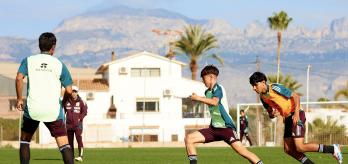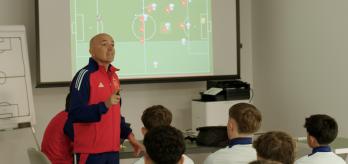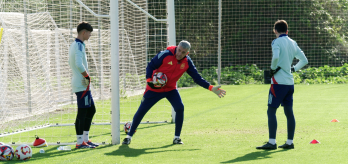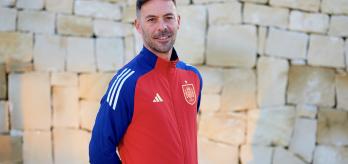First Half – Mexico Aims to Dominate the Ball
Mexico set up in a 4-3-2-1 formation in attack and a 4-1-4-1 in defence to dominate possession when attacking and regain the ball quickly in the defensive phase. As the UAE had worked on intense pressing during matchday -2 training, they were prepared to counteract Mexico’s build-up play.
-
Mexico looked to overload central areas when building out from the back. However, the UAE’s intense pressing forced Mexico to play wide, eventually creating errors and turnovers. Their opponents had the better of the opening minutes and were able to play into their number 9 and 10, creating several decent goalscoring chances.
-
Castro’s team were forced to deviate from their original game plan. They explored alternative build-up solutions like dropping their deepest midfielder between the two centre-backs or into the full-back position to facilitate play.
-
As the half wore on, Mexico’s practised pressing strategy allowed them to find their rhythm and spend more time in the opposition half. The centre-forward blocked central passing lanes while the wingers adjusted their positions based on the height of the opposition full-backs. The UAE struggled to build out from the back and had to play long diagonals to escape their defensive third.
-
Mexico took the lead in the 26th minute from a direct free kick. As they grew in confidence, the UAE’s press lost intensity, giving El Tri more chances from open play. Mexico’s second goal came from open play, but as the half ended, they still struggled to exploit the space in behind their opponent’s defensive line.
Half-time Talk – Castro Demands Better Coordinated Movements
Castro took advantage of half-time to make critical adjustments and reinforce themes from the training week.
-
Having seen his players too often take up the same space, he reminded them that they needed to coordinate their movements to avoid overcrowding certain areas of the pitch, especially during the build-up phase.
-
To stretch the pitch and create space, Castro asked his centre-forward and wingers to occupy the defensive line better by making runs in behind to push the UAE defenders back.
-
Mexico struggled to play through the UAE’s intense high pressing in the first half. Castro told his players the solution was to bypass the press by playing quick 1-2 passes.
-
Before sending his players back out for the second half, Castro reiterated his desire to see his team leave everything on the field. He asked two players to always compete in aerial duels, with one going to the first ball and the other positioning themselves to win the second ball. Finally, he demanded 110% from everyone, saying that 100% would not be enough to see them get the result.
Second Half – Mexico Struggles to Implement Tactical Adjustments
In the second half, Mexico struggled to implement the tactical demands Castro brought up at half-time. Their movement when building out from the back remained uncoordinated, and the centre-forward and wingers failed to adequately occupy the UAE defensive line. It made for a tighter second half as Mexico came away with a 3-2 victory.
-
The UAE striker was successful in winning his duels against the Mexican centre-backs. He held up the ball well and engaged his teammates. His physical presence and hold-up play led to the UAE’s first goal.
-
Mexico did succeed in maintaining their defensive intensity. Their defensive coverage was evident throughout the second half. Mexico’s third goal came from vigorous pressing and a speculative shot which the UAE goalkeeper couldn’t handle.
-
Castro’s team began finding greater success from short passing the longer the game went on, but they still struggled to get behind the UAE’s defensive line. To push the defence back, they began playing long balls in behind.
Post-match interview
After the game, Castro admitted that the UAE had been a tough opponent to face, but thought his team had played a good game. Mexico struggled to contain the UAE’s physical centre-forward but he was pleased that his side were able find their attacking players in pockets of space as they practised during the week. He also felt that the team pressed well during spells, using the centre-forward to apply pressure to the opposition central midfielder and the wingers and central midfielders to force the ball inside and create a turnover of possession. He believed his team needed to recognise when to drop off and press less.
Overall, the match was a formative experience for the Mexican players, who do not get to play teams of this level often. Castro felt that, in their opening match against Spain, his players shook off the rust, and against the UAE, they showed more of their personality.



















